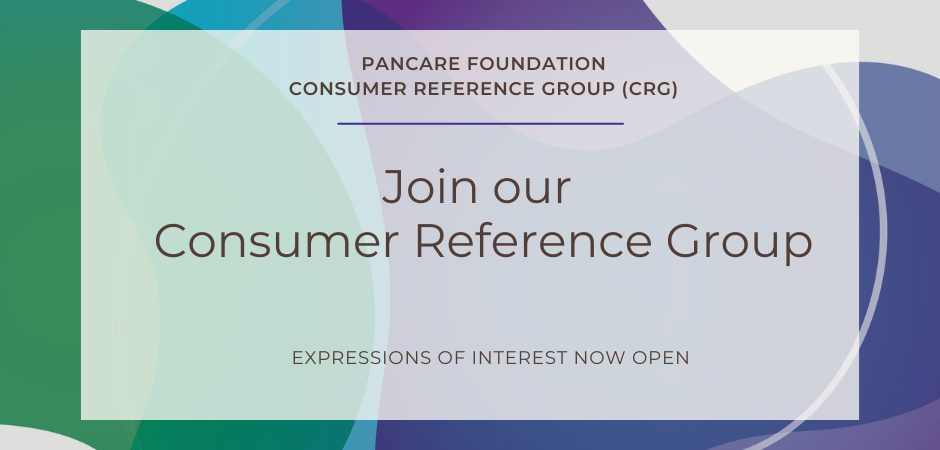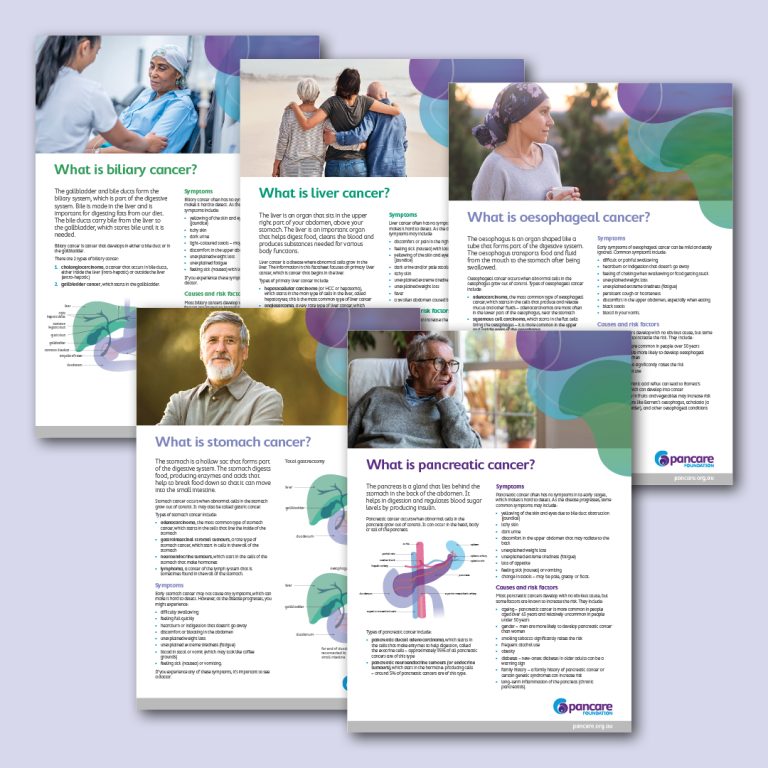I’ve just been diagnosed with an upper GI cancer. How can I process my diagnosis?
Receiving the diagnosis of pancreatic, stomach, liver, oesophageal or biliary cancer can be unnerving, confusing, and disorienting. You may have mixed emotions of surprise, disbelief, and anger; and you may feel sad and disappointed, with fear and uncertainty for the future. It’s important to know that these feelings are normal and that you’re not alone when coping with your cancer diagnosis.
Be informed
If you have no idea what cancer is, start by asking your doctor. He or she can explain how your type of cancer may affect your body. Ask your doctor about the side effects linked to the cancer and how to manage them.
It is important to know what kind and stage of cancer you currently have. Some forms of upper GI cancer, generally have a better outlook when diagnosed early, compared to those that are diagnosed at advanced stages. Knowing the cancer stage can help you understand what treatment options are available for you.
You should know whether:
- surgery is an option,
- you need chemotherapy,
- you need radiotherapy,
- you need endoscopic treatment,
- or whether you need a combination of these treatments.
You can ask about what to expect with each treatment. Know how long each treatment will be or what side-effects your medications or therapy might bring. Ask about whether there are studies to test new forms of treatment, such as new drugs, new approaches to surgery or radiation treatments or clinical trials and whether you are eligible to be in one.
You can also find out about what tests are available to monitor your progress.
Knowledge is power
There might be an overwhelming amount of information to gather, but as they saying goes, “Knowledge is power.” The more one knows, the more one is able to control events. The more you know about your cancer, the more empowered you become in determining the treatment that best suits you. Doctors can give advice and offer you options, but the right to make decisions about medical treatments remains yours.
Read more:
> Questions to ask your oncologist
Establish a support system
Devastation, disbelief and anger are only some of the emotions you might experience when diagnosed with an upper GI cancer. A cancer diagnosis is associated with high levels of psychological stress as it impacts on your family, work, relationships and daily activities.
Concerns about side-effects of treatments, loss of personal and social control, progressive weakening of the body, and thoughts of potential death is manifested through anxiety and even depression. This is the time when connecting with people is essential.
There is no easy way to live with cancer but having a good support system helps keep the burden lighter.
Talk to a spouse, a parent, a sibling, or your children
Communicate your worries and concerns about your condition. A family friend, a spiritual leader, a family counsellor, a palliative care specialist, or your GP, can give you guidance in processing your emotions regarding how cancer is affecting your body and your being.
Having a support system helps create:
- Emotional support – family members can offer esteem, trust, concern, and a listening ear.
- Instrumental support- friends and relatives, nurses and carers aid in money, time, labour, and/or in kind.
- Esteem (appraisal) support – friends can give encouragement and affirmation.
- Informational support – mates can give information, advice, instruction, and problem solving suggestions to be able to assist with everyday routines.
Support outside the immediate circle of family and friends is also possible. You can associate and connect with cancer survivors who have a lived understanding of your experience, through various channels, including Pancare’s PanSupport Online Support Group. Helplines are also available from the local government agencies and international organisations.
Participating in a support group for people with cancer has been found to significantly improve the emotional state (anxiety and/or depression), develop the relationship with a spouse, boost adaptation to illness, and overall enhance quality of life.
Take care of yourself
Upper GI cancer can affect your diet. You may need to see a dietitian and have special dietary arrangements. Problems with how your body processes food may arise but coping with dietary symptoms is possible.
Try to keep active by engaging in regular exercise. If you have not done any form of regular exercise before your diagnosis, start with small changes to your daily activities. Exercise has been shown to decrease psychological distress and help manage cancer-related fatigue, among other benefits.
Consider complementary therapies for handling symptoms
Complementary therapies can be used to manage the symptoms of upper GI cancer. The National Cancer Institute defines Complementary Therapies as “treatments used along with standard medical treatments but are not considered as standard treatments”. With increasing support to study Complementary and Alternative Medicine (CAM) scientifically, more therapy options are available to use, along with standard treatment, in managing cancer symptoms.
When necessary, consider hospice care
Talk to your doctor about Hospice Care. It is a specialised form of medical, psychological, and spiritual support that is provided to patients and their loved ones when cancer therapies are no longer controlling the disease. The focus of hospice care is control of symptoms and pain related to cancer, keeping you as comfortable as possible near the end of life. Entering hospice is by no means seen as giving up. It just means the goal of treatment has changed and you are taking control of your journey.
Consider making Advance Care Directives
Advance Care Directives is a legal document that helps others (family, friends, and medical personnel) know what future or end-of-life health care and living arrangements you want if the time comes that you are unable to make the decision yourself due to circumstances. This may include a sudden physical deterioration that leaves you unable to advocate for yourself. Advance directives differ from region to region and state to state, so it is best to check which laws apply to you.
Learn more:
>Advance care planning
Consider making an Enduring Power of Guardianship
This is a legal document where you can appoint one or more individuals to serve as an enduring guardian. He/She/They will be responsible for making personal, lifestyle and treatment decisions on your behalf.
As with advance directives, different states have different forms and laws governing the Enduring Power of Guardianship.
Consider setting finances and Will
Talk to your GP or a palliative care specialist to help you with grants and expenses related to your daily living, heating, and household costs. They may be able to help claim benefits for you and your carer(s).
Although advance directives and enduring power of guardianship are legal documents, they cannot be used in decisions regarding legal concerns and future finances. Seek legal advice when you make an Enduring Power of Attorney. It is a legal document giving power to an appointed person to manage your legal and financial affairs. This includes buying and selling real estate, shares and other assets, operating your bank accounts and spending money on your behalf.
In the unfortunate event that you may face death related to the severity of your pancreatic cancer, it is wise to be prepared by making a Will. A legal Will allows you to decide what will happen to your assets when you die.
We’re all different
There is no standard pathway to dealing with an upper GI cancer diagnosis – each person has a different set of circumstances at the time they discover they have cancer, and each person’s journey will be different. Knowing where to go and what to do next after receiving your diagnosis can assist in ensuring you are supported and don’t need to face your experience alone.

Speak to our Specialist Support Team for Emotional Support.
Specialist Support Team 1300 881 698





